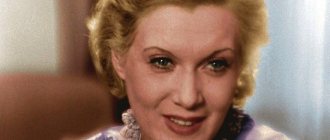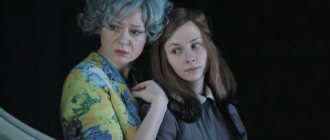Carier start
Actress Vera Orlova starred in thirty films. She has many theatrical works to her credit. Among them are roles in the plays “Not on the Lists” and “Young Guard”. She began her professional career at the Drama Theater (named after Mayakovsky), and her film debut took place in 1945. The young actress was immediately given one of the main roles in the film “Twins” (by the charming Liza Karaseva). The beginning turned out to be brilliant - after the release of this comedy film, the actress immediately became a celebrity, and almost all the men in the country fell in love with her at once.
Enthusiastic messages were written to her, fans tried by any means to get a photograph of her. One young man turned out to be so ardent and persistent that he achieved his goal - Vera Markovna became his wife, despite the significant age difference.
Other activities of actress Vera Orlova
In addition to filming films and acting on the stage, Vera Orlova managed to voice the heroines of foreign films, as well as characters in domestic cartoons. Her gentle voice is spoken by Princess Marya in the cartoon “In a Certain Kingdom” (1957), the Cat in “The Cat’s House” (1958), the Radish in the cartoon “Chippolino” (1961), the Fox in “I Want to Butt” (19680, etc. In addition , Orlova also worked at the All-Union Radio: for many years she hosted the humorous program “Good Morning!” in the guise of an employee of the information desk.
Orlova also carried out social activities - she was a deputy of the Moscow City Council, and joined the CPSU. Her work and other merits were quite highly appreciated by the country's leadership: in 1954 Orlova received the title of Honored Artist, and in 1960 - People's Artist of the RSFSR. In addition, she was awarded two orders - the Red Banner of Labor (1971) and the Friendship of Peoples (1981).
Don Quixote's wife
The actress doesn’t have many films – just over a dozen (although the reason is unclear, because Orlova’s talent became immediately obvious). In addition to “Twins,” she also played the main role in “Don Quixote’s Children” (1965), and everyone truly became attached to the kind and selfless Vera Petrovna. Anatoly Papanov played a central role in this film. The wife of the main character is Vera Orlova. The actress, whose personal life did not work out, played the role of a woman who raised children abandoned by their own mothers.
The film tells the story of a noble obstetrician. Petr Bondarenko spends most of his time at work. A loving wife and children are waiting for him at home. And only at the end of the film do viewers learn that Bondarenko’s adult sons are child refuseniks. Papanov's hero is a strong, unusually noble man. But how would his life have turned out if his loving and tender wife, played by actress Vera Orlova, had not been nearby? Personal life, family, children are the components of women's happiness. But the artist was deprived of all this. Like many representatives of her profession, Orlova at the end of her life found herself alone with loneliness.
Biography
Vera Markovna Orlova was born on May 25, 1918 in the Ukraine in Yekaterinoslav (now Dnepropetrovsk).
In 1936 she graduated from high school in Moscow, where she participated in an amateur ensemble, learned to play the guitar and learned children's songs. In 1937-1941 she studied at the Theater School at the Capital Theater of the Revolution, in 1941-1942 - an artist at the Lensoviet Capital Theater, in June-November 1942 (while in evacuation) - an artist at the Capital Theater of Satire in Khabarovsk. In 1942-1974 - artist of the Moscow Academic Theater. Vladimir Mayakovsky, where she played dozens of roles. Since 1974, she joined the theater troupe. Lenin Komsomol. She began acting in films in 1945. Her cinematic debut took place in the comedy “Twins”, where she played the role of Liza Karaseva, and she also performed a song in the film. Immediately after this picture she gained great fame. In total, the actress starred in 30 films. The audience’s extraordinary love was captured by the sweet Polina from the dilogy about Ivan Brovkin and the selfless Vera Petrovna (“Children of Don Quixote”).
She worked on the radio, on the stage, and took part in dubbing foreign films. For many years, the actress’s voice was heard in the popular humorous radio program “Have a Good Day!”, where she played the role of the help desk attendant.
Since the mid-1980s, due to a serious illness, she began to appear on stage less and less often, and it became increasingly difficult for her to move. She died 3 months after the festive celebration of her 75th birthday in Lenkom - September 16, 1993. She was buried in Moscow at the New Donskoye Cemetery.
Other films
Viewers also loved her less significant characters - Polina from the stories about Ivan Brovkin or Elena Bour from “12 Chairs”. She has such films as “We Can’t Forget About This,” “Seven Nurses,” “Solar Wind,” and several television plays (“Different People,” “Through the Pages of Satyricon”). She was equally charming and unique both in her youth and in adulthood, and at any scale of the role.
Other films with Orlova:
- "Precious gift."
- "Different destinies."
- "I bought dad."
- "Short Stories".
- "I loved you…".
- “We didn’t go through this.”
- "Sparrow on Ice"
A completely different Orlova. Amazing “love for three” by a Soviet artist
Vera Orlova was born on May 25, 1918 in Ukraine. Then her hometown was still called Yekaterinoslav, later it would turn into Dnepropetrovsk, subsequently the Ukrainian authorities retained only the first part: Dnieper.
Radish and Strawberry
Already at school, it was clear that the girl had bright creative abilities: Vera played in school plays and sang beautifully, being a soloist in the school amateur ensemble. By the way, in the future her vocal talent will more than once help her in her artistic career. In 1945, Vera Orlova played in the Soviet comedy “Twins” directed by Konstantin Yudin. Orlova herself performed the song of her heroine Liza Karaseva (authors: composer Oscar Sandler and poet Boris Laskin).
The artist’s voice also helped her a lot during her downtime in the cinema. She hosted a humorous radio program that gained wild popularity in the USSR: “Good morning!” She got the role of the information desk attendant. Listeners called her voice angelic. Also, the voice of Vera Markovna is spoken by the Cat in the most popular 1958 animated film “Cat's House”, Radish in “Chippolino” of 1961 and other cartoon characters. Moreover, Orlova’s voice in “Chippolino” was so liked by the authorities of the All-Union Theater that in 1962 she was invited to take part in the work on the album “The Adventures of Chippolino” by composer Nikolai Peiko, where the artist this time sang the part of Strawberry Shortcake.
As for cinema, the audience incredibly fell in love with the actress in the films of 1955 and 1958 about the soldier Ivan Brovkin, where Orlova played the barmaid Polina. The actress also played in the films “We Can’t Forget This,” “Seven Nurses,” and “Solar Wind.”
Vera Orlova and Mikhail Pugovkin in the film “Ivan Brovkin on Virgin Lands”, 1958
Perhaps the most memorable heroine of Orlova can be called plastic surgeon Vera Petrovna Bondarenko, the wife of obstetrician-gynecologist Pyotr Bondarenko played by Anatoly Papanov from the film “Children of Don Quixote.” In the story, a married couple adopted four boys: children of Bondarenko’s patients who decided to give up the child. The kindest, compassionate Vera Petrovna, according to the recollections of her colleagues, was very similar in character to the actress herself. She always helped people, fed young penniless artists with food brought from home.
Vera Orlova and Anatoly Papanov in the film “Children of Don Quixote.” 1966
They walked behind the coffin together with their rival
It so happened that for one USSR there were immediately two stars with the name Orlova. One is Love, bright, a real Soviet sex symbol. The second is Vera, performer of good women. Colleagues joked that for justice we also needed Nadezhda, who would play lyrical heroines, and then there would be the holy trinity of Orlov actresses who would cover the entire theater and film repertoire: Vera, Nadezhda, Love.
The actress’s personal life was tragic. A very strong love happened in her life, but it was not destined to develop and end with a wedding. Vera Markovna loved the handsome actor of the Theater. Mayakovsky Alexander Kholodkov, who played Major Lyapunov in the Soviet-Bulgarian film “Heroes of Shipka”, Captain Pokhitun in the film “Stars on Wings”, Pyotr Chumak in the film “Shift Starts at Six”. Unfortunately, Orlova’s chosen one could not be called free: he lived with the popular actress Lucyena Ovchinnikova, whom, however, he also had no intention of marrying.
Alexander Kholodkov in the film “Stars on Wings”, 1955.
In an interview, Ovchinnikova’s friend said: “Lucy considered herself his common-law wife. And she didn’t stop thinking so, even when Sasha started an affair with actress Vera Orlova. Lucy reacted to this with understanding.” Actress Galina Anisimova recalled in an interview that when Vera Orlova and Kholodkov began an affair, everyone slandered the situation, not only Lucien Ovchinnikova, but also the entire theater was hard pressed about the situation. But Orlova and Ovchinnikova, like two wise women, understood that if they love one person, then there can be nothing here except friendship. “And they became very friendly, helped each other. And Vera Markovna helped Lyusya to the last,” Anisimova said in a conversation with a journalist.
Moreover, when Alexander Vasilyevich suffered from a serious illness, Orlova and Ovchinnikova joined forces and looked after their common loved one. This was a real female friendship that no one could understand, this situation was maligned in the theater world. “But Lyusya and Vera endured everything with dignity,” Ovchinnikova’s friend said in an interview.
Katya from "Girls". Why Lucyena Ovchinnikova was lonely By the way, in “The Children of Don Quixote” Orlova played just at the moment when her beloved was ill. As colleagues recall, Orlova, without even taking off her makeup, rushed home to help care for Kholodkov.
On September 14, 1965, Alexander Kholodkov died in the arms of his two women. At the funeral at the Vvedensky (German) cemetery, they stood together at the coffin: they supported each other and cried, hugging each other. Those who came expressed condolences to both.
Orlova took the loss very hard and threw herself into her work. She played in films, dubbed the main characters in foreign films, and appeared on stage in the theater. But her soul was heavy; Orlova was tormented by loneliness and female unfulfillment. And then, out of desperation, she accepted a sudden marriage proposal. After one of the performances, a young admirer confessed his love to the actress... Lonely Orlova agreed to become his wife. Naturally, the marriage did not last long.
Vera Orlova and Savely Kramarov in the film “12 Chairs”, 1976. Photo: Still from the film
The last striking film works of Vera Markovna can be called the four-part television film of 1976 by Mark Zakharov based on the novel by I. Ilf and E. Petrov “The Twelve Chairs”, where the actress played Elena Stanislavovna Bour, and the film “Sparrow on Ice” (Tatyana Ivanovna, watchwoman).
At the end of her life, Vera Orlova played at Lenkom in the plays “The Thief” and “Not on the Lists.” Colleagues at the theater jokingly called Vera Markovna a “time bomb”: the actress knew how to introduce new nuances and colors into the interpretation of her heroines every time, which constantly surprised her stage colleagues.
And Ostap was carried away... How the film “12 Chairs” failed at its first showing on TV In the mid-eighties, Orlova began to get seriously ill, her legs were giving out. She experienced immobility dramatically. Alone, in an empty apartment, and she can’t even walk, she can’t act in films and theater. The actress passed away on September 16, 1993: 3 months after Lenkom loudly celebrated the 75th anniversary of the Soviet legend. Dozens of people and colleagues came to the funeral of Vera Markovna Orlova at the New Donskoye Cemetery. Many already mature actors recalled that in their early youth they managed to survive only because Orlova fed them every day at home, accepting them as if they were her own children.
Orlova Vera Markovna, born May 25, 1918, Ekaterinoslav.
People's Artist of the RSFSR. https://t.co/Xs4hZiWl pic.twitter.com/wOVizLwo — RAZVOZ (@razvozcom) December 13, 2012
Theater
It was literally impossible to get tickets to the Mayakovsky Theater for performances with her participation. Vera Markovna also “came to the court” at the Lenin Komsomol Theater, where she moved to work in 1974 in “age-specific” roles. Colleagues noted her ability to use the most insignificant details of an image to give it character and liveliness. Orlova knew how to introduce such details into the game at the most unexpected moments, which is why other actors awarded her the nickname “Time Mine.”
The actress was also a prominent figure on the radio - her mesmerizing voice attracted everyone's attention to the program “Good Morning!”
Official recognition did not leave Vera Markovna either. In 1954 she was awarded the title of Honored Artist of the RSFSR, and in 1960 - People's Artist. Colleagues at the theater were looking forward to various collective celebrations in order to enjoy delicacies from Orlova - she knew how and loved to cook and willingly shared the results of her efforts with friends. Having no children of her own, she treated aspiring artists like a mother, helping them get comfortable and advance. Perhaps, it still cannot be said that actress Vera Orlova was absolutely lonely. The family of the heroine of this article are colleagues in the theater, partners on the set. The heroine of this article belonged to people who were able not to become bitter even after heavy blows of fate.
The most interesting
Shameful photos of drunk actresses (10 photos) (01/05/2018)
Actresses with big noses (03/22/2018)
The actress took care of the young actors, passed on her experience to them, and also gave everyone valuable advice. On the Internet you can find photos in which the artist is depicted in her youth, when she was just starting her acting career, as well as at a more conscious age, when her creative path was coming to an end.
Last years
In the early eighties, Vera Orlova began to develop a serious leg disease. It became difficult to move, the actress appeared on stage less and less. The gradual withdrawal of close friends from her life exacerbated her depressed mood. The course of the disease became more severe, constant pain actually pulled Orlova out of active life.
However, her colleagues did not forget her, and almost the entire Lenkom staff came to visit Orlova on her 75th birthday. The attention gave the woman strength. But she managed to hold on to the happy memories for a little longer...
Vera Orlova died on September 16, 1993, three months after ceremonial events related to her anniversary were held in the theater. She was buried at the Donskoye Cemetery in Moscow.
Orlova, Vera Markovna
Born on May 25, 1918 in Yekaterinoslav (now Dnieper, Ukraine).
In 1941 she graduated from the Moscow City Theater School at the Theater of the Revolution (now the Moscow Academic Theater named after Vl. Mayakovsky). She studied in the workshop of Vladimir Gotovtsev.
In 1941-1942 was an actress at the Moscow Theater. Lensovet (later merged with the Theater of the Revolution). In 1942 she performed as part of the evacuated Moscow Satire Theater in Khabarovsk and Chita. From 1943 to 1974 - actress of the Moscow Academic Theater. Vl. Mayakovsky. She began working in the theater under the direction of director Nikolai Okhlopkov. She was involved in the plays: “The Little Student” and “Rhapsody in Blue” based on the plays of Nikolai Pogodin, “Ladies and Gentlemen” and “Little Chanterelles” based on the works of Lilian Helman, “The Young Guard” based on the novel by Alexander Fadeev, “The Thunderstorm” and “Talents and Admirers” "based on the plays of Alexander Ostrovsky, "Uncle's Dream" based on the story by Fyodor Dostoevsky, etc. From 1974 to 1993 she was a member of the troupe of the Moscow State Theater. Lenin Komsomol (now the Moscow State Theater "Lenkom"). She played in the following plays: “Til” based on the play by Grigory Gorin, “Not on the Lists” based on the novel by Boris Vasiliev, “Ivanov” based on the work by Anton Chekhov, “The Thief” based on the play by Wieslaw Mysliwski. Vera Orlova was known as a film actress. Her first work brought her popularity - the role of Liza Karaseva in Konstantin Yudin’s comedy “Twins” (1945), where Orlova played together with Lyudmila Tselikovskaya. Among the actress’s other most famous roles: canteen employee Polina Kuzminichna in Ivan Lukinsky’s comedies “Soldier Ivan Brovkin” (1955) and “Ivan Brovkin in Virgin Lands” (1958), doctor Vera Petrovna Bondarenko in the film story “Don Quixote’s Children” (1965, director Evgeny Karelov), Elena Stanislavovna Bour in the comedy “12 Chairs” based on the novel by Ilya Ilf and Evgeny Petrov (1976, Mark Zakharov), etc. Vera Orlova’s last film work was the role of watchman Tatyana Ivanovna in the children’s film “Sparrow on Ice” (1983 , Valentin Khovenko). In total, she starred in more than twenty films. She took part in dubbing Soviet cartoons (1949, “Geese-Swans”; 1958, “Cat House”; 1961, “Cipollino”, etc.), dubbing foreign feature films. In the 1960s worked on the radio in the program “Good Morning!” Vera Orlova died on September 16, 1993 in Moscow at the age of 75. She was buried at the New Donskoy Cemetery in Moscow.
In 1959-1960 was a deputy of Krasnopresnensky, in 1961-1962. - Frunzensky District Council of Moscow. In 1969-1970 was a deputy of the Moscow City Council.
People's Artist of the RSFSR (1960). She was awarded the Order of the Red Banner of Labor (1971) and the Order of Friendship of Peoples (1981).











